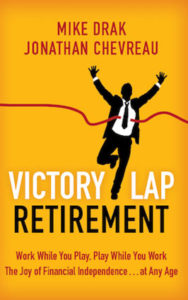 Who doesn’t want a Victorious Retirement?
Who doesn’t want a Victorious Retirement?
Just in time for the long weekend and Canada’s 150th birthday, MoneySense.ca has just published a 5-part series on retirement, going from deciding what you want to working longer, the Ages & Stages by decade, being a snowbird, and finally what to do once you finally reached the hallowed land of Retirement/Findependence/Victory Lap.
Here’s a summary of each piece (all written by Yours Truly), and links to the full articles:
 1.) The first step: What do you really want?
1.) The first step: What do you really want?
Take a custom approach to retirement planning. There’s no point fretting too much about retirement and how much to save if you haven’t first determined what you want to DO once you’re retired. For starters, how are you going to fill those 2,000 hours a year you use to spend in the office and commuting? Click here for full article.
 2.) We live longer. Why not work longer?
2.) We live longer. Why not work longer?
Ask questions about a retirement plan that’s right for you. Life expectancies are on the rise: more and more Baby Boomers can expect to become centenarians and that probably goes double for their children, the Millennials. Makes sense to consider working a little longer, if only part-time. Or if you really dislike your chosen profession, go back to school or retrain and find something you’d really enjoy doing in your golden years: preferably something that pays! Click here for full article.
3.) Snowbird? Learn the “substantial presence” test
 Learn the tax pitfalls of retiring to the sun in the U.S. It all depends on how long you plan to stay down south each year: the formula isn’t simple. If you don’t relish the thought of paying tax to two countries, you may want to make sure you’re not considered to have a “substantial presence” in the U.S. Click here for full article.
Learn the tax pitfalls of retiring to the sun in the U.S. It all depends on how long you plan to stay down south each year: the formula isn’t simple. If you don’t relish the thought of paying tax to two countries, you may want to make sure you’re not considered to have a “substantial presence” in the U.S. Click here for full article.
4.) Your retirement plan has a life cycle

Retirement planning strategies for every age. Every decade from your 20s to your 70s and beyond should take you a little further along the journey to financial independence/Retirement. Just like we all share the same fate in our human life cycle, so it is with the financial life cycle. Click here for full article.
5.) Retirement planning —after you retire
The plan doesn’t stop when you stop working.
 My co-authored book Victory Lap Retirement features on its cover what appears to be a sprinter breaking through the finish line of a long marathon. But that doesn’t mean we’re saying Retirement is a literal finish line and with it the end of striving and purpose. In fact, we’re saying a “Victory Lap” really only begins when you reach the “finish line” of financial independence, or Findependence.
My co-authored book Victory Lap Retirement features on its cover what appears to be a sprinter breaking through the finish line of a long marathon. But that doesn’t mean we’re saying Retirement is a literal finish line and with it the end of striving and purpose. In fact, we’re saying a “Victory Lap” really only begins when you reach the “finish line” of financial independence, or Findependence.
There will still be a big adjustment as you move from Wealth Accumulation to the De-accumulation or “Decumulation” phase: less earned income and more passive sources of income. And you’ll need to master the tax aspects because Tax may be one of the biggest expenses in Retirement. Click here for full article.
 “If you can dream it, you can achieve it” is a saying more often seen on an inspirational Instagram account than in a financial blog. While I am loath to agree with the sentiment of a mere bumper sticker, dreaming really can be an excellent tool for those struggling to get their financial futures in order.
“If you can dream it, you can achieve it” is a saying more often seen on an inspirational Instagram account than in a financial blog. While I am loath to agree with the sentiment of a mere bumper sticker, dreaming really can be an excellent tool for those struggling to get their financial futures in order.









